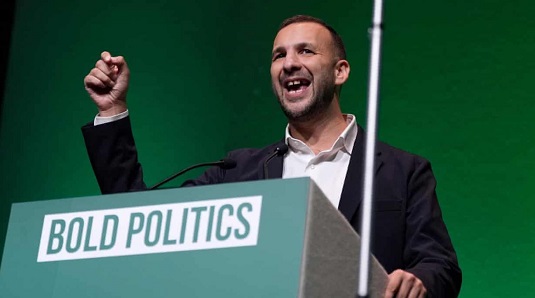
There has been some pushback from centrist sensiblism. Duncan Robinson, writing as Bagehot in the regular Economist column attacks wealth tax populism as a measure that won't raise a great deal, and certainly not as much as Polanski supposes. As such, this is irresponsible politics. It peddles the myth that the refurbishment of public services can be managed without taking more tax off most people. If this was put to the test, the measure would fall short and state revenues would have to be found from elsewhere. This is a recipe for political damage and disillusionment if the Greens or the left or whoever tries flying in the face of fiscal realities. That, and it would scare the wealthy off. In short, Polanski is promising "a world of common good without sacrifice; a vision of socialism without society."
Two points are worth mulling over here. Polanski and the Greens are absolutely correct to push for a wealth tax. It's a demand designed to shift the political direction of travel away from the right, both in terms of the oligarchical economics the main parties embrace and the racist gutter politics of immigration and asylum. That the political establishment, from the mainstream to the far right have united against wealth taxes is a sign that the Greens have hit a common sensitive spot.
The second point is on what taxes are for. The Economist, as the bourgeois house magazine, deals in common sense. Their common sense. The state's finances are like a household budget, and taxes go into its "current account" - the consolidated fund, which is held by the Bank of England. Like any normal account, its income and outgoings have to be managed and it's not great if the latter exceeds the former. Hence the need for more tax revenues if we want to fund more things. Leaving aside well-worn critiques of this, such as the state being able to borrow from itself, having the power to structure its own debt, and how public spending can boost the tax take through multiplier effects, there are other ways of looking at tax. Chris Dillow, for example, makes the case of using tax to reallocate labour to priority areas. Another way of looking at it, the socialist way, understands that tax isn't about balancing the books. It's a tool for remaking society.
In addition to tax measures that disproportionately hit the wealthy as helpfully outlined by Prem Sikka, if anything Polanski's wealth tax does not go far enough. Steeply progressive income tax, graded rates of employers' National Insurance Contributions based on staff levels and turnover, taxes on dividends, City capital flows, levies on rental income, punitive multiple property ownership taxes, measures aimed at high end luxury consumption, action against offshore wealth repositories under British jurisdiction, and so on. This would be accompanied by tax incentives to encourage cooperatisation, democratise workplaces, the meeting of certain social, civic, and environmental objectives, etc. The concerns of such a tax programme is not primarily about raising money, but lashing capital in chains, abolishing the super rich, removing power from the unaccountably wealthy, and making inroads into the private ownership of the means of life. Obviously, such an approach to tax can't stand up on its own. It needs a mass movement behind it, concerted activity with others across the globe, and a political understanding that they would meet fierce elite resistance - and a programme to defeat it.
In other words, tax needs to be recognised as a weapon. The establishment knows it can be used against them, just as they've used it against us. And for that reason, the left, regardless of its party colours, should keep pushing for wealth taxes.
Image Credit
No comments:
Post a Comment